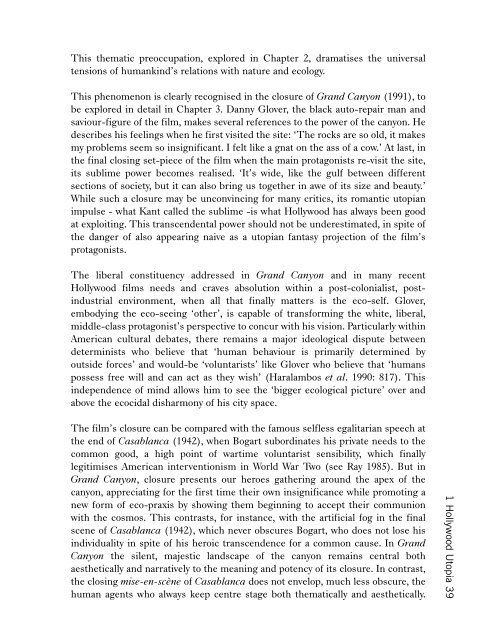Hollywood Utopia
Hollywood Utopia
Hollywood Utopia
You also want an ePaper? Increase the reach of your titles
YUMPU automatically turns print PDFs into web optimized ePapers that Google loves.
This thematic preoccupation, explored in Chapter 2, dramatises the universal<br />
tensions of humankind’s relations with nature and ecology.<br />
This phenomenon is clearly recognised in the closure of Grand Canyon (1991), to<br />
be explored in detail in Chapter 3. Danny Glover, the black auto-repair man and<br />
saviour-figure of the film, makes several references to the power of the canyon. He<br />
describes his feelings when he first visited the site: ‘The rocks are so old, it makes<br />
my problems seem so insignificant. I felt like a gnat on the ass of a cow.’ At last, in<br />
the final closing set-piece of the film when the main protagonists re-visit the site,<br />
its sublime power becomes realised. ‘It’s wide, like the gulf between different<br />
sections of society, but it can also bring us together in awe of its size and beauty.’<br />
While such a closure may be unconvincing for many critics, its romantic utopian<br />
impulse - what Kant called the sublime -is what <strong>Hollywood</strong> has always been good<br />
at exploiting. This transcendental power should not be underestimated, in spite of<br />
the danger of also appearing naive as a utopian fantasy projection of the film’s<br />
protagonists.<br />
The liberal constituency addressed in Grand Canyon and in many recent<br />
<strong>Hollywood</strong> films needs and craves absolution within a post-colonialist, postindustrial<br />
environment, when all that finally matters is the eco-self. Glover,<br />
embodying the eco-seeing ‘other’, is capable of transforming the white, liberal,<br />
middle-class protagonist’s perspective to concur with his vision. Particularly within<br />
American cultural debates, there remains a major ideological dispute between<br />
determinists who believe that ‘human behaviour is primarily determined by<br />
outside forces’ and would-be ‘voluntarists’ like Glover who believe that ‘humans<br />
possess free will and can act as they wish’ (Haralambos et al. 1990: 817). This<br />
independence of mind allows him to see the ‘bigger ecological picture’ over and<br />
above the ecocidal disharmony of his city space.<br />
The film’s closure can be compared with the famous selfless egalitarian speech at<br />
the end of Casablanca (1942), when Bogart subordinates his private needs to the<br />
common good, a high point of wartime voluntarist sensibility, which finally<br />
legitimises American interventionism in World War Two (see Ray 1985). But in<br />
Grand Canyon, closure presents our heroes gathering around the apex of the<br />
canyon, appreciating for the first time their own insignificance while promoting a<br />
new form of eco-praxis by showing them beginning to accept their communion<br />
with the cosmos. This contrasts, for instance, with the artificial fog in the final<br />
scene of Casablanca (1942), which never obscures Bogart, who does not lose his<br />
individuality in spite of his heroic transcendence for a common cause. In Grand<br />
Canyon the silent, majestic landscape of the canyon remains central both<br />
aesthetically and narratively to the meaning and potency of its closure. In contrast,<br />
the closing mise-en-scène of Casablanca does not envelop, much less obscure, the<br />
human agents who always keep centre stage both thematically and aesthetically.<br />
1 <strong>Hollywood</strong> <strong>Utopia</strong> 39
















